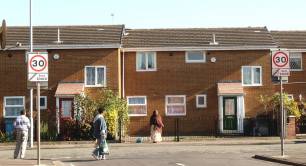Housing associations challenged: "What is your social purpose?"
As the Housing and Planning Bill moves through the House of Lords, it was a pertinent time for housing associations to be challenged about their social purpose.
The new legislation will see government making grants to housing associations that offer homes for sale. Housing associations can do this either through granting social tenants the right to buy or by building starter homes. Changes were announced in the budget and Autumn Statement last year.
As David Orr, CEO of the National Housing Federation, told board members of housing associations at its annual conference: “The decisions you make will have a profound effect on how we change the United Kingdom, towns and cities and individual neighbourhoods.”
The proportion of people in social housing has dropped from almost a third (31.4%) in 1980 to one in seven today (16.8%). By contrast, the percentage renting from private landlords has risen from 11.9% in 1980 to 18% today – the highest in more than 30 years, according to the English Housing Survey for 2012-13. Housing associations provide approximately 60% of the social housing in England. Critics of the bill have expressed concern that it will further deplete the stock of social housing.
Orr told board members that 2015 was “as seismic a year for them as 1974 when grants from government for housing associations had been introduced”. He summarised the role of housing associations over the last 40 years: they accessed money, built homes for people on low incomes, maintained them and developed a range of services around that, such as childcare. “The expectation for most of the last 40 years has been if you build a home you keep it and if you build a home for social rent, you keep it for social rent for the whole of its lifetime,” he said.
With the new housing bill set to become law, Orr then went on to tell the assembled audience: “That world has gone.” Successive governments of different political colours have broadly viewed housing associations as a good idea. Historically governments have believed that there should be a programme for housing associations, at the heart of which should be the provision of rented housing. In 2015 “we got a July budget and a spending review that said, after the money in the programme already has gone, there is no money for social rent, no money for affordable rent, you get money for owner occupation", said Orr.
He continued: “For the first time since 1974 we have a government that said ‘we are not sure if you are part of the solution, you may be part of the problem. We might be quite happy to see what you do wither on the vine. After all, you’re a manifestation of the welfare state, you house all the welfare junkies, why should we need you? We’ve got far too much social housing anyway.” Orr related that he had spoken to ministers who had asked him why most of western Europe’s housing stock of social housing stood at 10% of the total when the UK had 20%. “We are facing a degree of critical exploration of who we are and what we do of the kind we have not seen since the 1974 act.”
In the face of this he challenged board members to decide what their mission should be. In closing, he reminded housing associations that they existed for the benefit of the community: “You hold those assets in trust for the benefit of the community. The mission is something that is determined by you.”
Photo credit: Ruth Hartnup



